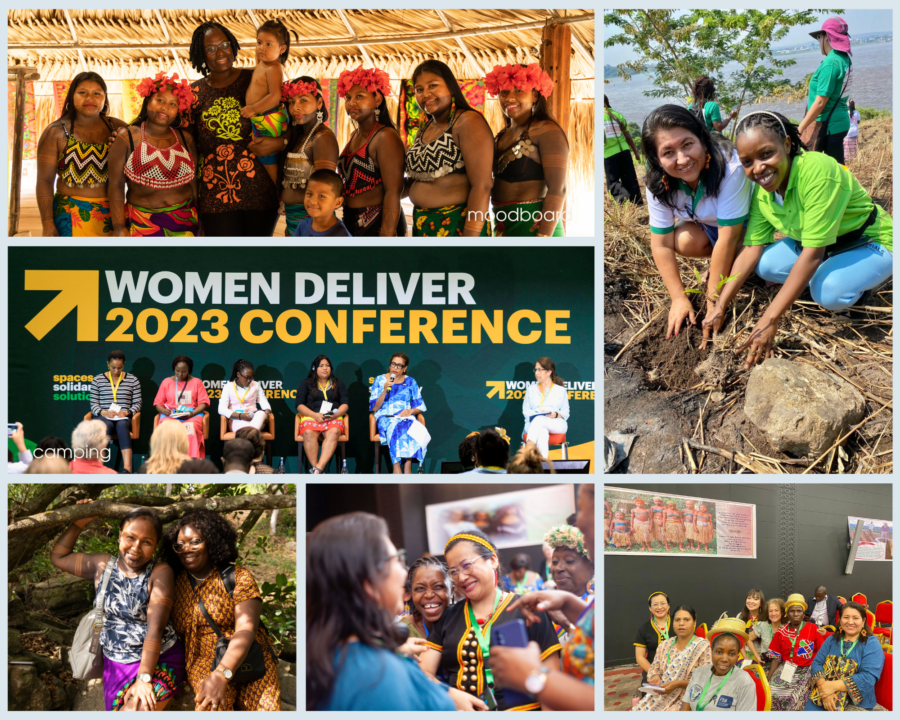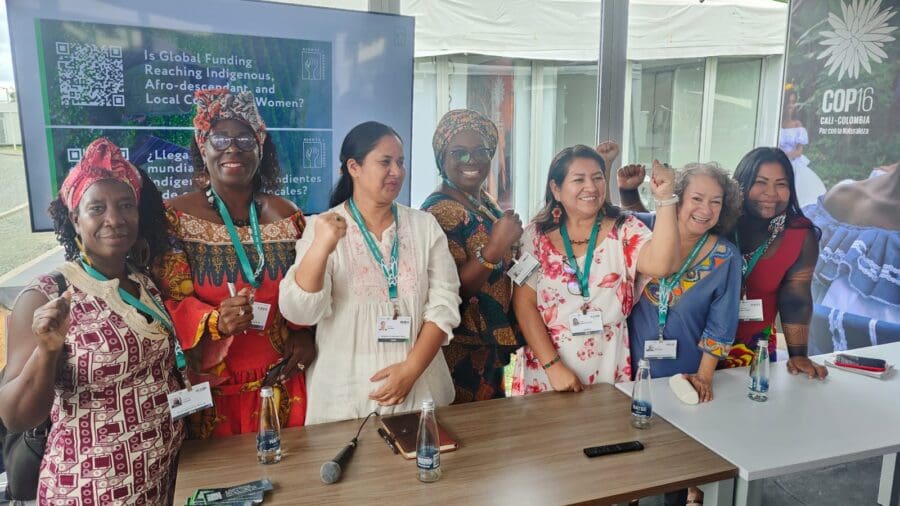Gender Justice
RRI leverages Indigenous, Afro-descendant, and local community women’s capacity to transform social, economic, and environmental agendas, ultimately supporting inclusive and equitable development, sustainable natural resource governance, and effective climate action.
We work to achieve the following outcomes for Indigenous, Afro-descendant, and community women in Asia, Latin America and Africa:
- They participate actively in the creation and implementation of policies that affect their land and resource rights in laws and customary systems.
- They exercise their leadership, participation, and decision-making rights in national and global platforms on land, forest, and resource management, climate change, and biodiversity.
- They have the knowledge, tools, and training to promote their economic models and food security.
- They create and promote mechanisms to prevent and reduce criminalization and violence against women.
Our Strategies
- Strengthen coordination and peer-learning in tenure advocacy initiatives among Indigenous, Afro-descendant, and community women’s networks in Africa, Asia, and Latin America.
- Position women as leading voices at the national level and on international platforms.
- Create conditions at the national level to advance gender-inclusive policies that recognize women’s land and resource rights and contributions to local economies, food security, conservation, and climate efforts.
- Issue a global Call to Action for gender-inclusive climate finance to ensure and facilitate women’s access to the US$1.7 billion Pledge made by governments and donors at COP26 in 2021.
- Facilitate the Women in Global South Alliance, a new network of women’s organizations, groups, and associations in the Global South working to scale up direct climate finance for Indigenous, Afro-descendant, and local community women and girls.
The Women in Global South Alliance (WiGSA)
At CoP27 in Sharm-El-Sheikh, Egypt, women’s organizations from Asia, Africa, and Latin America launched a new advocacy network called the Women in Global South Alliance for tenure and climate (WiGSA). It is an alliance of women’s organizations, groups, and associations in the Global South working to scale up direct climate finance for Indigenous, Afro-descendant, and local community women and girls.
RRI mobilizes Indigenous, Afro-descendant, and local community grassroots women’s organizations and networks from Africa, Asia, and Latin America. In 2021 and 2022, we organized a series of cross-regional exchanges to identify ongoing local efforts to advance systemic changes regarding women’s tenure rights. This strategy had two significant results: i) the publication of a new advocacy tool called Our Call to Action on International Women’s Day in 2022; and ii) launch of a Global South Alliance between Indigenous, Afro-descendant, and local community women at UNFCCC COP27.
WiGSA was formed to enhance women’s strategic advocacy at national and international levels focusing on influencing government, donors, and the international community to increase and secure direct climate finance for Indigenous, Afro-decendant, and local community women’s rights agendas.
Learn more about WiGSA and its strategies and priorities on The Land Writes Blog, including outcomes of its annual meetings in 2023 and 2024.
WiGSA and the CBD COP16
At the Biodiversity COP16 in October 2024, RRI and WiGSA hosted a side event titled, “Women’s Voices on Rights-based Conservation: The Role of Indigenous, Afro-descendant, and Pastoralist Women in Protecting the World’s Biodiversity.” The event highlighted the crucial role of Indigenous, Afro-descendant, local, and pastoralist women in conserving natural resources and leading climate change action. We presented the strategies that WiGSA is developing to i) respond to the dual biodiversity and climate crises; ii) transform the structural gender-based discrimination and exclusion that renders women’s leadership invisible; and iii) shine a light on the inequalities women experience that limit their right to participate in decision-making spaces.
RRI and WiGSA also launched a new brief on Is global funding reaching Indigenous, Afro-descendant, and Local community Women? This brief identified how climate change and conservation funding is reaching Indigenous, Afro-descendant, and local community women on the ground and whether this funding responds to their rights-based agendas. The well-attended event was featured in The Guardian, Mongabay, Delfino, Context News, El Tiempo, Tehelka, and El Espectador alongside posts on social media from donors and allies.
Helpful Analyses
- Global Call to Action: Urging Donors and Policymakers to Support Gender-inclusive Climate Finance
- Is Global Funding Reaching Indigenous, Afro-descendant, and Local Community Women?
- Resilience and Resistance: Analyzing Women’s Statutory Rights to Community Forests
- Legislative Best Practices for Securing Women’s Land Rights
- Ten Factors Contributing to Successful Initiatives on Indigenous and Rural Women’s Rights
- Gender-differentiated Impacts of Large-scale Land Acquisitions in Liberia
- Using International Law to Advance Women’s Tenure Rights in REDD+
Email us with your questions!
Impact Stories
- Paving the Way Forward: WiGSA Holds its First Strategic Meeting
- WiGSA Introduces its First Roadmap for Advocacy for Indigenous, Afro-descendant, and Local Community Women
- Governments and Donors Must Listen to Indigenous Women and Girls to Save the Planet
- How Local and Ethnic Women are Transforming Their Economies in Latin America
- Can Liberia’s Land Rights Law Improve Community Women’s Livelihoods?
- In Nepal, Indigenous Women Generate Green Jobs Through Lime Cultivation
- In Nayagarh, India, Community Women Get Long-due Recognition for Protecting Their Forests


